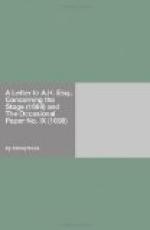After all, my Lord Foppington was never design’d to teach People to speak or act like him; nor was it intended that the Ladies shou’d be byass’d by the Example of Berinthia to turn Coquetts. These and the like Characters in other Plays, are not propos’d as a Direction for the Gallant Man, or the Vertuous Lady; but that seeing how such Persons behave themselves on the Stage, that they may not make the like Figure in the World; but if any body shou’d rather be in love than terrified by these Examples, ’tis their Fault, and not the Poets, since the best things are liable to Corruptions. But it may be objected, That our Poets don’t make Persons speak like themselves. That indeed is a Fault, and I can’t say any thing to excuse it but this; That they who, have the Judgment to know when a Poet speaks improperly, ought to have so much Judgment, as not to be byassed by his Irregularities: The People who don’t understand it, generally suppose, that what is Vertuous is to be imitated, and what is Vicious is to be avoided. That this is the general Observation of those who frequent Plays, may justly be inferr’d from the Practice of the Town: For I challenge any Man to prove, That any one Vice, now in being, took its Rise from the Stage. The Stage takes Examples from the Town. The Scene must be really acted in the World before it comes to be expos’d: So that whatever appears Vicious or Ridiculous, is owing to the Wickedness of the Times, and not to the Theatre. It may be objected, That what is generally acted on the Stage, if it was done before; yet it was done in private, but the Stage publishes it. To this I answer, That it does not intend to license it, only to set it in a true Light, that it may be expos’d and shunn’d.
As to those Objections, That the Actors are generally debauch’d, and of leud Conversation; and that no Person who is a known Adulterer, or Profane, ought to be encouraged. That the Play-house is a Resort of vicious Persons, and gives Opportunity to such who have wicked Inclinations. All these wou’d fall upon the advancement of a regular Stage; but as ’tis, the Objections are not levell’d Right; for the State is chargeable with the Immoralities.




